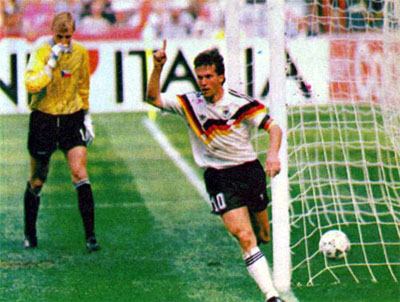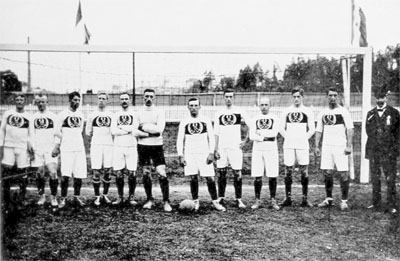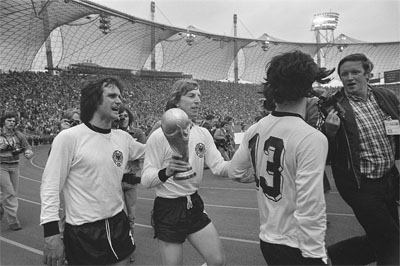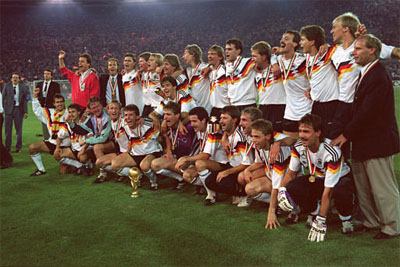Germany
At one point in the early ‘50s, Germany had no less than three national teams. These teams represented the Saarland, the Democratic Republic, and the Federal Republic. The latter team – known as West Germany – was the most successful one, winning three World Cups and two European Championships. Since the country’s reunification in 1990, Germany claimed two other major trophies, cementing its place as one of the greatest national teams of all time.
Main trophies
World Cup: 4
UEFA European Championship: 2
Player records
Most games played: Lothar Matthäus (150)
Top goalscorer: Miroslav Klose (71)
Stats

Lothar Matthaus scoring for West Germany.
History
Foundation and early history
In 1900, the German Football Association (DFB) was founded by representatives of 86 clubs. This played a major part in consolidating various German regional competitions into a single national league, which came to pass in 1902. The national team played its first official match in 1908, losing to Switzerland 3-5. They took part in the 1912 Olympics football tournament, which is remembered for Gottfried Fuchs scoring 10 goals in a 16-0 victory against Russia.

The 1912 Olympic team.
The DFC selected the players for the national team until 1926, at which point they appointed Otto Nerz as the coach. After missing out on the inaugural World Cup due to not being able to afford travel to Uruguay, Germany managed to qualify for the 1934 World Cup. They went on to beat Belgium and Sweden, but were eventually defeated by Czechoslovakia in the semi-finals. They finished off the tournament on a positive note by beating Austria in the 3rd-place match.
Post-WWII split
On the eve of WWII, Austria was annexed into Germany. The Austrian national team was promptly disbanded, with several of their players being forced to join the German team by Nazi politicians. Germany then took part in the 1938 World Cup, but was unable to advance past the first round in front of a hostile crowd. This remains Germany’s worst World Cup appearance to this day – they made it to the final eight in all other tournaments they competed in.
Following the end of WWII, Germany was separated into three separate states: West Germany, East Germany, and Saarland. All of them were banned from international competitions until 1950, which prevented them from participating in the 1950 World Cup. Most of the country’s pre-war traditions and organizations were succeeded by West Germany, including the DFB. After the World Cup, the DFB was accepted as a full FIFA member.
The miracle of Bern
Four years later, West Germany had little trouble qualifying for the 1954 World Cup. They were placed in a group containing Hungary, Turkey, and South Korea. Following a convincing 4-1 victory in the first match against Turkey, coach Sepp Herberger decided to rest his best players for the Hungary game. They proceeded to lose 3-8, but still managed to qualify for the knockout stage by beating Turkey 7-2.
The Germans then beat Yugoslavia (2-0) and Austria (6-1), staging a rematch with the Mighty Magyars in the finals. This Hungarian team – led by the legendary Ferenc Puskás – is widely considered to be one of the best national teams in the history of the sport. By that point in time, they had not been defeated in 32 consecutive matches. Considering the rout in the first match, it’s safe to say they were strong favorites to win the finals.
By the 8th minute, Hungary was already 2-0 ahead. However, West Germany responded with goals from Max Morlock and Helmut Rahn, tying the game before the end of the first half. At that point, Hungary completely took control of the game, but it was Rahn who scored the winning goal in the 84th minute, leading West Germany to their first World Cup title. This upset – called the miracle of Bern – played a big role in the country regaining international recognition.
Tough losses
The following two World Cups were relatively successful affairs. In the 1958 edition of the tournament, they placed 4th after losing to Sweden in the semi-finals and France in the 3rd place match. The 1962 World Cup was a slight step back, as West Germany was eliminated by Yugoslavia in the quarter-finals. The DFB responded to these losses by introducing professionalism to German football, assembling the Bundesliga in 1963.
The 1966 World Cup saw Germany make its way to the finals, where they were set to play hosts England. Though England held a 2-1 lead until the final minutes of the game, West Germany managed to equalize via Wolfgang Weber, taking the match to extra time. George Hurst then put England ahead by scoring a controversial goal off the crossbar. With spectators rushing the field in the final moments of the game, Hurst added another goal for the final 4-2 score.
Four years later, West Germany would take revenge by knocking England out in the quarter-finals. However, the semi-finals against Italy saw them suffer another heartbreaking loss. In a match later titled “game of the century,” Germany again equalized the game moments before the final whistle. They proceeded two score two goals in extra time via Gerd Müller, but it was not enough to beat the Italians, who scored three.
More major trophies
In 1972, West Germany participated in its first European Championship. In the qualifiers, they placed first in a group containing Poland, Turkey, and Albania. In the playoffs for the final 4-team tournament, they again defeated England 3-1 on aggregate. At the tournament proper, they beat Belgium (2-1) and the Soviet Union (3-0), with Müller scoring four goals. This was their first major trophy in 18 years.
The 1974 World Cup saw West Germany play on home soil, which contributed to them being the favorites for the title. In the first round, West Germany was drawn with East Germany, Chile, and Australia. With both German teams safe to advance before the final round, East Germany won the politically charged match-up 1-0. This loss saw West Germany adjust their line-up and tactics, improving their odds of winning the competition.
After advancing from the second group containing Poland, Sweden, and Yugoslavia, West Germany made it to the finals with the Netherlands. The Dutch team was led by Johan Cruyff and played an attractive brand of “total football,” which made them formidable opponents. They grabbed the lead very early on, with Neeskens converting a penalty. However, West Germany came back with goals from Breitner and Müller, winning the game 2-1.

German players and photographer after winning the World Cup.
Continued success
Despite continuing to field solid teams at the next two major tournaments, West Germany failed to defend either of its titles. In the finals of the Euro 1976, they managed to come back from 0-2 down, but eventually lost the game on penalties. At the 1978 World Cup, they failed to advance from the second group stage after losing 1-2 to Austria in the deciding match. This led to a new coaching change, with long-time assistant Jupp Derwall taking the helm.
Under Derwall, West Germany cruised to another major title at the Euro 1980. This was the first European Championship to feature eight teams, and West Germany had to place first in its group to reach the finals. They did so by defeating Czechoslovakia (1-0) and the Netherlands (3-2), drawing with Greece in the final round. In the finals, they beat Belgium 2-1 on a brace from Horst Hrubesch.
The 1982 World Cup didn’t start well for West Germany, as they lost the opener against Algeria. However, they managed to recover by beating Chile and Austria. In the second group stage, they drew 0-0 against old rivals England and defeated Spain 2-1. The semi-finals match against France was a dramatic affair, with West Germany barely prevailing on penalties. However, they didn’t have enough left in the tank for the finals against Italy, who beat them 3-1.
The Beckenbauer effect
Following a disappointing appearance at the Euro 1984 – a group stage exit – the DFB turned to its former captain, Franz Beckenbauer. As a coach, Beckenbauer exhibited many of the same qualities he brought on the field. With him at the helm, West Germany was almost guaranteed to reach the semi-finals of any given tournament.
This proved true at the 1986 World Cup, where the German team fought through the arid conditions to reach the finals. However, they were no match for the Maradona-led Argentina team, losing the game 2-3. Two years later, they made it to the Euro 1988 semi-finals, but the Netherlands were dead-set on gaining revenge for their loss at the 1974 World Cup. Despite leading 1-0 for most of the second half, West Germany eventually lost the match 1-2.
In its third consecutive World Cup finals appearance in 1990, West Germany finally claimed its third tournament title. As a whole, this tournament is mostly remembered for its lack of goals and defensive tactics. On its way to the finals, the Germans defeated the Netherlands (2-1), Czechoslovakia (1-0), and England (4-3 on penalties). The final match against Argentina was a dull affair, with Andreas Brehme scoring the winner in the 85th minute.

German squad celebrates the 1990 World Cup victory.
Reunion
Following this victory, Beckenbauer retired from the national team and was replaced by Berti Vogts. However, the fall of the Berlin Wall earlier that year had an even bigger impact on the team, as it meant that West Germany and East Germany would finally reunite. This became official in October 1990, with the East German Football Association (DFV) being absorbed into the DFB. The unified German team played its first official game against Switzerland.
The first major tournament for the new-look Germany was the Euro 1992. After advancing from its group, Germany defeated Sweden 3-2 on the way to the finals, where they lost to surprise winners Denmark. The 1994 World Cup seemed to be a chance at redemption, but they were upset by Bulgaria in the quarter-finals. Despite leading for most of the match, Germany allowed their opponents to overturn the score and win the match 2-1.
The Euro 1996 was the first tournament that included 16 teams and awarded 3 points for a victory (instead of the previous 2). Germany had little trouble acclimating to the new rules, as they advanced from their group and beat Croatia and England on their way to the finals. They then defeated the Czech Republic 2-1 on an Oliver Bierhoff brace, which included the first golden goal to decide a major tournament.
Lost years
After claiming its first trophy as a unified nation, Germany entered one of the worst slumps in its history. At the 1998 World Cup, they were upset by Croatia in the quarter-finals. The following two European Championships (2000 and 2004) were particularly disappointing for the fans, as they failed to advance from the group stagel.
Although a tough draw (England, Portugal and Romania), the Euro 2000 was one of the least glorious tournaments for the team. They only claim one point in three matches. In the last game, one of the greatest players in the national team, Lothar Matthäus, did his last appearance, 39 years old. His career ended with a painful 0–3 defeat against Portugal.
The 2002 World Cup didn’t inspire much confidence either, especially given the fact that Germany barely managed to qualify for the tournament. Still, a series of close 1-0 victories in the knockout stages saw them make a surprise appearance in the finals, where they were set to play Brazil. A suspension of star midfielder Michael Ballack reduced their chances dramatically, however, and they lost the game 0-2.
Four years later, Germany found itself in a very similar position. Once again, they outperformed the expectations, recording three victories in their group and defeating Sweden and Argentina in the knockout stages. In a hard-fought semi-finals showdown against eventual champions Italy, they were eliminated by two quick goals at the very end of extra time. They then defeated Portugal in the third-place match, with Miroslav Klose receiving the Golden Boot.
A new era
With the promotion of Joachim Löw to head coach in 2008, Germany traded in their signature defensive-minded style for an attacking one. The first signs of this change were noticeable at the Euro 2008, where Germany fought their way to the finals with Spain. Without an effective answer for the Spanish “tiki-taka,” though, Germany lost the game 0-1.
The following two European Championships also saw Germany put in strong performances. In 2012, they won all three group matches and defeated Greece in the quarter-finals – setting a record of 15 wins in competitive matches – but later lost to Italy 1-2. In 2016, they also met their end in the semi-finals; this time, they were unable to advance past France, who recorded their first competitive victory against Germany in 58 years.
In between these two appearances, Germany famously won the 2014 World Cup. After securing a spot in the knockout stages, they squeezed past Algeria in the round of 16 (2-1) and France in the quarter-finals (1-0). In the semi-finals, they recorded a historic 7-1 victory over hosts Brazil, scoring four goals within a 7-minute span in the first half. They went on to defeat the Messi-led Argentina in the finals on a late Mario Götze winner.
FIFA World Cup results
Germany has participated 20 times in the World Cup (FIFA World Cup qualification not included).
| Year | Result | Notes |
|---|---|---|
| 2022 | Group stage | |
| 2018 | Group stage | |
| 2014 | Winners | 4th tournament title |
| 2010 | 3rd place | |
| 2006* | 3rd place | |
| 2002 | Runners-up | |
| 1998 | Quarter-finals | |
| 1994 | Quarter-finals | |
| 1990 | Winners | 3rd tournament title |
| 1986 | Runners-up | |
| 1982 | Runners-up | |
| 1978 | Round 2 | |
| 1974* | Winners | 2nd tournament title |
| 1970 | 3rd place | |
| 1966 | Runners-up | |
| 1962 | Quarter-finals | |
| 1958 | 4th place | |
| 1954 | Decline to participate | |
| 1950 | Winners | 1st tournament title |
| 1938 | Round 1 | |
| 1934 | 3rd place | |
| 1930 | Decline to participate |
* Host nation.
UEFA European Championship results
Germany have participated 14 times in the European Championship (Euro).
| Year | Result | Notes |
|---|---|---|
| 2024 | Quarter-finals | |
| 2020 | Round of 16 | |
| 2016 | Semi-finals | |
| 2012 | Semi-finals | |
| 2008 | Runners-up | |
| 2004 | Group Stage | |
| 2000 | Group Stage | |
| 1996 | Winners | 3rd tournament title |
| 1992 | Runners-up | |
| 1988* | Semi-finals | |
| 1984 | Group Stage | |
| 1980 | Winners | 2nd tournament title |
| 1976 | Runners-up | |
| 1972 | Winners | 1st tournament title |
| 1968 | Not qualified | |
| 1964 | Decline to participate | |
| 1960 | Decline to participate |
* Host nation.
By Martin Wahl
Logo
 Coat of arms of Germany, the black eagle, is dominating the logo. Around it, "Deutscher Fussball-bund" (German Football Association) is written in two part in the circle. At the bottom, the three colors of the flag of Germany is included, which is a novelty compared to the former logo version. Four stars is often visible above the logo, symbolizing the four World Cup victories.
Coat of arms of Germany, the black eagle, is dominating the logo. Around it, "Deutscher Fussball-bund" (German Football Association) is written in two part in the circle. At the bottom, the three colors of the flag of Germany is included, which is a novelty compared to the former logo version. Four stars is often visible above the logo, symbolizing the four World Cup victories.
External links
References:
https://en.wikipedia.org/wiki/Germany_national_football_team
https://en.wikipedia.org/wiki/History_of_the_Germany_national_football_team
https://en.wikipedia.org/wiki/Germany_at_the_FIFA_World_Cup
https://en.wikipedia.org/wiki/Germany_at_the_UEFA_European_Championship
Image source:
1. Unknow
2. IOC
3. Bert Verhoeff / Anefo
4. Unknown